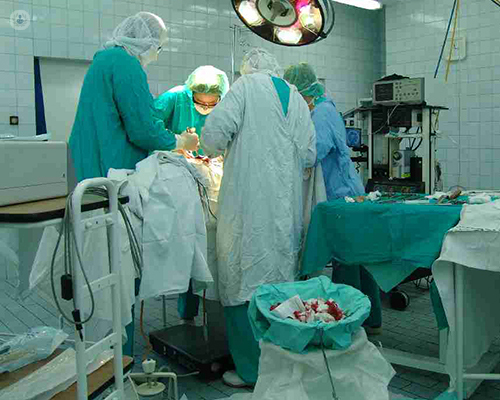



What is a colectomy?
Colectomy is a surgical procedure that involves the removal of all, or the partial sectioning, of the large intestine (colon). The colon is a long tube-shaped organ at the end of the digestive tract. A colectomy is necessary to treat or prevent diseases and conditions that affect the colon.
Diseases and conditions treated with a total or partial colectomy
The following conditions may require a colectomy:
- Bowel obstruction – when the colon is blocked.
- Bowel perforation – a torn colon, or where bleeding cannot be controlled.
- Crohn’s disease – removing the affected part of the colon.
- Colon cancer – early-stage cancers may need a small section of the colon to be removed, whilst cancers at a later stage may require more to be removed.
- Lynch Syndrome
- Precancerous colon polyps – those with a high-risk of developing cancer.
- Ulcerative colitis – a colectomy is required if medications are not working.
Different types of colectomy operations
A total colectomy removes the entire large intestine. A partial colectomy, also known as a subtotal colectomy, removes only part of the colon. A hemicolectomy removes either the right or the left portion of the colon and a proctolectomy removes both the colon and the rectum.
Open vs. laparoscopic procedure for colectomy
During an open colectomy, a long incision is made in the wall of the abdomen and doctors can see the colon. In a laparoscopic-assisted colectomy, a lighted tube with a video camera is in inserted through one of several small incisions to guide the surgery.
Risks of a colectomy
The procedure carries a risk of serious complications, which depend on the patients' general health and the type of colectomy used to perform the operation. These complications can include:
- Bleeding
- Deep vein thrombosis (blood clots in the leg)
- Infection
- Injury to organs near your colon, such as the bladder and small intestines
- Pulmonary embolism (blood clots in the lungs)
- Tears in the sutures that reconnect the digestive system.
How to prepare for a colectomy
In the days leading up to the colectomy, the doctor will suggest that the patient stops taking certain medications. Fasting before surgery is also required and drinking a solution such as a laxative that clears your bowels. In some cases, a doctor may prescribe antibiotics to prevent any infection from occurring.